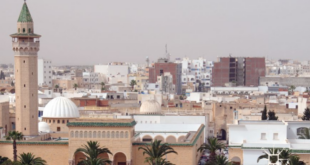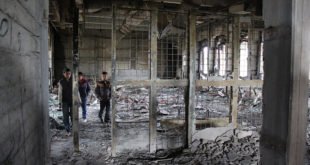The long-anticipated English-language Al Jazeera International (AJI) is due to launch in the second quarter of 2006. TBS’s new senior editor Lawrence Pintak talked with AJI’s managing director Nigel Parsons, to find out about the hopes riding on the new channel as well as the challenges facing it.
TBS: Let’s start with some basics. Why are you creating this channel?
NP: That is really question for the Qatari government. But, I suppose I would say this is a very reformist government. It is pretty visionary. They are spending an awful lot of money on health, education and infrastructure, and since the formation of Al Jazeera channel, they have been at the forefront of media freedom and I think they have been as surprised as anyone by the runaway success of Al Jazeera. But they decided to build on that success and launch a global channel.
TBS: Can you sum up what the mission of the channel is?
NP: Basically, we will be the first global news channel based in the Middle East looking outwards, and we think we will be bringing in a completely fresh, 360 degree perspective to the news and thereby revolutionize viewer choice, reverse the flow of information; perhaps present the news from a different perspective, and therefore be a conduit to greater understanding between different peoples and different cultures.
TBS: To what degree is AJI going to be a mirror of Al Jazeera in Arabic?
NP: It won’t be a mirror precisely, because otherwise there wouldn’t be these four broadcast centers. We’d just do it out of Doha if it was going to be a mirror. We will have a much more global agenda and we are reaching out to global audience, not just the Arabic speaking one. Having said that, where we co-locate, we will share resources. We certainly expect to have the best contacts and news coverage of the Middle East for any global news channel and we will try to bring Arabic perspectives or portray an Arabic perspective on major world events.
TBS: You mentioned co-locations. Talk to me about where the main centers are and how a broadcast day is going to roll.
NP: We will have broadcast centers in Kuala Lumpur, Doha is the headquarters, obviously, London and DC. DC covers North and South America. London is basically to cover Europe, and Doha covers Africa, South Asia and the Middle East. And Kuala Lumpur is Southeast Asia, Australia, Thailand. Doha will carry the signal for approximately 12 hours a day and the other 12 hours will be more or less divided up between the other three.
TBS: You mentioned co-locations, and obviously in some places there will be AJ crews, reporters, etc. You have your own team, but talk to me about that mix. How are you going to use your own people? Will you be using AJ reporters on the air?
NP: I don’t think we’ll be using many reporters from other channels, simply because many of them don’t speak enough English and the one or two exceptions to this rule particularly if they are in a place were we are not, we’d look for an English voice track. But, really, we are talking about an absolute handful of reporters where their English is good enough. In terms of other sharing of resources, if there is a bulk of standard, fairly boring press interviews, why would we send two crews when one crew would do? We can send one crew somewhere else. Again, in our major stories, big breaking news, we will try to split the resources so we get maximum use out of those crews.
TBS: And who are your reporters?
NP: Some of them have been announced. Others we will be rolling out in due course. The process is still underway.
TBS: But, in terms of national mix?
NP: National mix? At the moment, we have some Africans, and Europeans and Middle Eastern people and South and Southeast Asians, Americans, both North and South. North includes Canada as well as America. So across the board, we expect just over 30 nationalities.
TBS: What is the total figure you are shooting for?
NP: Total, probably some where about 350-400, but that is including all the technical staff.
TBS: On-air reporters? Ballpark number.
NP: Ballpark number of on-air reporters, probably 20, 25.
TBS: Talk about the programming mix. You have people like David Frost. Are we looking at both talk shows and breaking news? How does the day roll?
NP: We are looking at mix of talk shows, news programming, news analysis, documentaries and news programming. The news will generally take up the first half hour of any given hour. But we will be focusing a lot on news analysis and editorially on events in the developing world. There are a lot of issues going on which we feel are not being properly covered.
TBS: On that issue of perspective and analysis, how do you think you are going to differ from CNN and BBC, Sky and the others, some of which you’ve worked for?
NP: Sky in particular is a UK domestic channel we don’t really regard them as global channel in the way we will be. I think the others who, no fault of their own, but they are coming out of these powerful countries and they absolutely naturally reflect the agendas of those countries. We are coming out of this tiny speck of this country, which is globally centrally located, and I think that gives us an advantage because not only do we see things from a different perspective where we are sitting, but we are not encumbered with domestic baggage and that gives us a chance to have a cleaner all-round perspective.
TBS: One of the raps on Al Jazeera is ‘hands off, kid gloves’ when it comes to Qatar. How you see that?
NP: I don’t see many stories in Qatar. I mean there are oil and gas stories here. I have been here for over a year. I can’t think of any stories here that I would categorize as kind of global news stories. But we would expect to look at anything, you know. There are regional stories, and we would look to cover them the way we would cover anywhere else.
TBS: You are obviously going to be under microscope because of the criticism of AJ, from academics analyzing you to the various lobbies, etc. How are you prepared for that?
NP: There is not an awful lot we can do about it. One way we are preparing is talking to you today. If I really had a choice, I’d like to launch very quietly, but you can’t because of the brand we are. We will be under a spotlight. I think the only thing we are asking is for people to judge us for our own merit.
TBS: In terms of news coverage on a day to day basis, is there a joint editorial strategy meeting with AJ? What level of cooperation? How does that pan out?
NP: We’d expect to share our planning meetings and planning lists, but at the end, each channel will be making its own decisions as to which news agenda they will follow each day, which is most relevant to the audience they are trying to reach.
TBS: We talked about the reporters. Who is your management team? Who do you report to?
NP: I report to the chairman of the board. The rest of the management team all have international experience, which is one of the keys we are looking for. Again, nationality was not the issue and then as we get down to deputy director level and head of departments it spreads out pretty quickly across nationalities and ethnic mix, if you like.
TBS: Is www.aljazeera.net, the English site, going to be under your wing or is that going to be separate?
NP: No, that will be under our wing and will work closely with the international channel.
TBS: Right now it doesn’t really reflect the television content. Will it be doing that more?
NP: I would say so, yes. We do believe Web sites and news channels should work very closely together.
TBS: Let’s talk about the distribution. How are you getting the signal out there?
NP: We’re getting it out through mixture of satellites, which will provide a global signal, although that’s probably the easy bit. The harder bit is tying up all the carriage deals with cable operators and direct-to-home satellite operators.
TBS: And how is it going?
NP: It is going very well in most parts of the world. We’ve been delighted with Europe. South Asia, Southeast Asia has really been knocking at an open door—apart perhaps from Australia—and the Middle East and Africa have been very receptive. South America, we would expect to be a work in progress for some time, and then of course there is North America, where there is some resistance from some quarters, not just because of the Al Jazeera name. Some cable operators are very upfront and say Americans just aren’t interested in the international news or the outside world, which is kind of sad when we’re trying to have some sort of understanding between people.
TBS: Do you have any signatures on paper in North America?
NP: We have verbal agreement and I wouldn’t really expect to have the final contract—the ‘Ts’ crossed and the ‘Is’ dotted at this stage. We’ve still got some way to go, but we’ve got verbal commitments which I am quite happy with.
TBS: I know you can’t say who, but with major players or some small cable distributors?
NP: A mixture, a mixture. Certainly with one that I’d regard as big.
TBS: The Israel lobby certainly is not going to be sitting with open arms waiting for you to arrive.
NP: Oddly enough, I have been discussing this in Israel, and Israel is one of the few countries in the Middle East that has never even temporarily shut Al Jazeera operations down. You know Al Jazeera was the first Arab broadcaster to allow Israelis on air to put their side of the story. While sometimes the Israelis feel that maybe Al Jazeera takes a too pro-Arab stance, at the same time they do realize this would give them a chance to put their side. We just had a senior news visit to Israel and we were afforded every courtesy up to the highest level of government.
TBS: But, as you well know, the Israel lobby in the States and Israeli policy in Israel are not necessarily the same thing.
NP: No, No, I mean, that is true. There is a lobby in the States that some times tends to be more conservative than Israel itself, but that’s just something that we have to overcome.
TBS: We talked about the (Qatari) government’s desire to put this channel on the air. Can you tell me a little bit about the funding, what kind of budgets do you initially have and what kind of commitments?
NP: I can’t give you figures because it is confidential information, but I can say we’re not awash with unlimited petrodollars. We’ve got quite strict budget, which we think is do-able, but we have to be creative to achieve what we want to achieve within that budget. We are expected to create revenue streams and we’re looking to hopefully break even within three to five years, although when you talk about the financials you have to talk about us as a network and not break out the individual channels.
TBS: But, if you look at it as a network, clearly, Al Jazeera—despite being ranked right up there as a global brand name etc., and having largest audience in the world, according to some estimates—is still hobbled by this, may it’s too strong word, but an advertiser’s blacklist. The pressure on advertisers not to advertise in AJ. How is that playing out when it comes to you?
NP: Again, early days. We shouldn’t be quite as restricted because we are working in a much wider market and I think advertising cake is a fairly limited cake in the Middle East anyway, especially in the Arabic-speaking Middle East. Again, these channels are not always the most popular channels for broadcasters and that’s why the network comes into play because there’s sports channel, one, two and three, and a children’s channel and a documentary channel coming on stream. You mentioned Sky earlier. I am not 100 percent sure, but my understanding is Sky News still loses money, but the network makes money.
TBS: Are any of your programs out of house or is everything in house?
NP: No, quite a lot of it is out of house. We would, to a large extent, be a commissioning center looking to independent producers from their own regions producing material that fits in with the overall agenda of the channel.
TBS: Anything you want to add?
NP: I think it is a tremendously exciting project. We feel there is room for another news channel. Some people are skeptical. Our research shows there is a hunger for it. We’ve had very good reception from those independent producers and distributors in most of the world and I think we are going to surprise people. I hope you’ll be watching.
TBS: I will certainly be watching.
 Arab Media & Society The Arab Media Hub
Arab Media & Society The Arab Media Hub




